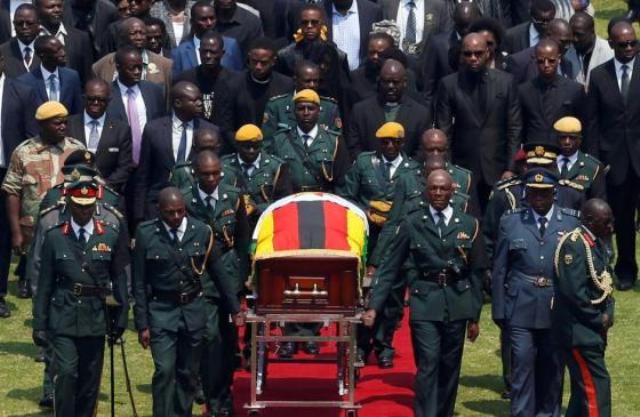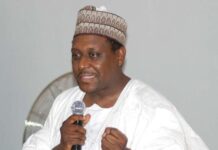
Continental leaders congregated at the Harare National Stadium yesterday to honour Zimbabwe’s late former President Robert Mugabe who died on Friday, September 6, 2019 while being treated in Singapore.
Aged 95, Mugabe led Zimbabwe for 37 years, from independence until he was ousted by the army in November 2017.
Banners at the stadium, where Mugabe’s body lay in state ahead of the funeral, read “Hamba Kahle, Gushungo,” (go well, Gushungo)”, a reference to his clan name, and “Pioneer of nationalist politics”.
The 95-year old former leader who was barely seen or heard from following his forced resignation in 2017, was showered with praises from many in attendance, including his former deputy and now president, Emmerson Mnangagwa.
African leaders, past and present, filed into the stadium to applause, alongside veterans of the continent’s liberation struggles.
The public tributes to Mugabe’s role as a liberation hero – paid by a succession of speakers including Kenya’s President Uhuru Kenyatta – came in sharp contrast to the final words of the Mugabe family’s own representative, Walter Chidhakwa, whose voice cracked as he spoke of his uncle’s final years after he’d been removed from office.
“He was a sad man. A sad, sad, sad man. It was a hard and excruciating journey.”
It was a powerful reference to the clear tensions that still exist between the current government and the Mugabe family.
More than a dozen current and former African leaders attended the funeral, hailing Mugabe as a pan-Africanist who had dedicated his life to the people of Zimbabwe.
Mnangagwa walked behind the casket carrying Mugabe’s body as it was wheeled into the centre of the stadium and placed on a podium decorated with flowers so that ordinary Zimbabweans could say their farewells.
“A giant tree of Africa has fallen,” eulogized President Mnangagwa of the man he called a mentor and father figure, before their falling out.
“The bold, steadfast and resolute revolutionary, Comrade Robert Gabriel Mugabe, is no more,” he added.
Mugabe’s widow and former First Lady Grace Mugabe, dressed in black with a veil covering her head, did not address the gathering, but has been present at all occasions, accompanied by her children.
The foreign heads of state in attendance included South African President Cyril Ramaphosa, Kenyan President Uhuru Kenyatta, and President Teodoro Obiang Nguema Mbasogo of Equatorial Guinea.
Former presidents who attended included Kenneth Kaunda of Zambia, Festus Mogae of Botswana, and South Africa’s Thabo Mbeki.
President Ramaphosa, who was booed upon taking the microphone for the violence in South Africa that has claimed many lives, eventually gained the audience’s applause when he apologized for the attacks, and reassured the nation that South Africans were not xenophobic.
“I stand before you as a fellow African to express my regret and express my regret and to apologize for what has happened in our country,” said Ramaphosa, his speech interrupted by an extended applause.
Ramaphosa said the violence in South Africa, perpetuated against mostly foreign Africans, was out of tune with what former President Mugabe stood for, as well as former South African President Nelson Mandela and former President of South Africa’s African National Congress Party, Oliver Tambo.
“What happened in South Africa goes against the principle of the unity of African people that President Mugabe and President Nelson Mandela, Oliver Tambo and the great leaders of our continent stood for.”
However, he insisted: “We as South Africans are not xenophobic”.
Nigeria’s vice president, Prof. Yemi Osinbajo had eulogised Mugabe saying he stood out as a leader because of his zeal, passion and selfless commitment to the emancipation of the people of Zimbabwe and the self realization of black people everywhere.
“Mugabe stood out as one of those leaders whose zeal, passion and selfless commitment to the emancipation of the people of Zimbabwe was not only a great encouragement to the independent movement everywhere, but more to the self-realization for black people practically everywhere.
“So, his passing is indeed sad. I think that for most of us, especially those who are leaders today, there’s a lot to learn from such an incredibly illustrious career, especially the role that he played in decolonization.
“And, of course, alongside the work that was done, not just by the frontline states, but by the likes of Nelson Mandela in South Africa and so many other African patriots; their lives and times, especially during the period of the struggle for black majority rule in Southern Africa and the support that other African countries gave, especially sub-Saharan African countries; Nigeria being, as you’ve noted, a frontline state. There are times when I think we should be extremely proud of what we achieved as black people.
“Nigeria most respectfully condoles with the Republic of Zimbabwe on the passing of her President, Robert Mugabe – who led the republic and her people to freedom and majority rule – alongside so many other patriots. His legacy of determined, proud and assertive black emancipation will live long in the hearts of Africans. We wish the people of Zimbabwe great peace and prosperity,” said Osinbajo.
Opposition figures too attended the state funeral, among them Nelson Chamisa, the leader of Zimbabwe’s opposition Movement for Democratic Change, and Julius Malema, president of South Africa’s Economic Freedom Fighters.
While many in the crowd praised Mugabe’s legacy as a liberation icon and some of the policies like education that he enforced to elevate the status for many Zimbabweans, Mugabe received criticism even in death, for the poor state of the country’s economy.
“He was both a good man and a bad man,” said secretary general Nixon Nyikadzino of Zimbabwe’s opposition Movement for Democratic Change (MDC-T) party led by Dr. Thokozani Khupe.
Explaining further, Nyikadzino, said, “For the sake that he brought independence to us, we must thank him for that. But for having brought us to where we are, the suffering that the Zimbabwean people are faced with, it’s another shame on him.”
Meanwhile, the nephew and spokesperson for the Mugabe family, Leo Mugabe, said the nation should now just celebrate the life of the former leader, and stop mourning him as he lived a long life.
“We must stop mourning and start celebrating his life,” he said of his uncle, who died at the age of 95.
Cleo Mapuranga, a caterer, told Reuters: “I feel low because Mugabe fought for us.
“I remember him for land to the blacks, economic freedom and higher education, which was non-racial’’.
“Now, people are suffering; no one is controlling the prices in the shops.
“Our finance minister is trying to implement first-world policies, which don’t work in third-world countries.’’
When and where will Mugabe be buried?
The funeral follows a row between the Mugabe family and the government over his burial.
It has now been agreed his remains will be interred in a mausoleum at the National Heroes Acre in the capital Harare in about 30 days, his nephew said on Friday, contradicting earlier comments that burial would be held on Sunday
Earlier plans to have a burial on Sunday appear to have been cancelled.
Who was Robert Mugabe?
Mugabe was Zimbabwe’s first leader after the country became independent in 1980. He held on to power for almost four decades before being ousted in the 2017 coup.
During his early years, he was praised for broadening access to health and education for the black majority.
However his later years were marked by violent repression of his political opponents and Zimbabwe’s economic ruin. An increasing number of critics labelled him a dictator.
He seized land from white owners in 2000.
Mugabe famously declared that only God could remove him from office.
In 2017 he was placed under house arrest and, four days later, replaced as the leader of his party Zanu-PF by his former vice president, Emmerson Mnangagwa.
Mugabe initially refused to resign. But, on 21 November, as a motion to impeach him was being debated in the Zimbabwean parliament, the speaker of the House of Assembly announced that he had finally left office.
Mugabe negotiated a deal which protected him and his family from the risk of future prosecution and enabled him to retain his various business interests. He was also granted a house, servants, vehicles and full diplomatic status.
BBC/The Zimbabwe Mail/NAN/Reuters

















































